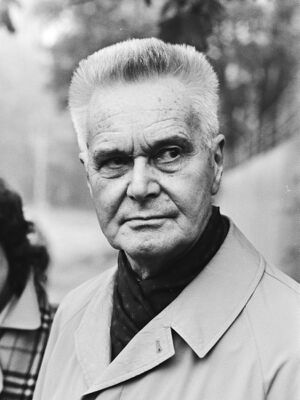Jan Tinbergen
( economist, academic) | |
|---|---|
 In 1982 | |
| Born | 12 April 1903 The Hague, Netherlands |
| Died | 9 June 1994 (Age 91) The Hague, Netherlands |
| Nationality | Netherlands |
| Alma mater | Leiden University |
| Siblings | Nikolaas Tinbergen |
| Interests | Economics |
Dutch economist who presented a paper at the 1966 Bilderberg meeting where the subject was "The future of world economic relations especially between industrial and developing countries." Selected for the Nobel Memorial Prize in Economic Sciences in 1969. | |
Jan Tinbergen was a Dutch economist who presented a paper at the 1966 Bilderberg meeting where the subject was "The future of world economic relations especially between industrial and developing countries." He was selected for the the Nobel Memorial Prize in Economic Sciences by the Swedish Central Bank in 1969. He attended the (CIA funded) 1948 Hague Congress, which had a profound influence on the shape of the European Movement.
Education
Tinbergen studied mathematics and physics at Leiden University. But soon his interest was also in political issues. In his doctoral thesis with Paul Ehrenfest in 1929, he combined mathematical methods with economic questions. He became a pioneer of mathematical modeling and econometrics, the application of statistical methods to economic data in order to give empirical content to economic relationships[1].
Career
From 1929 to 1945 he worked for the Statistical Office of the Netherlands. He also taught in Amsterdam in the early 1930s and in Rotterdam from 1933 to 1973. He worked there as an editor for a journal in the field of business cycle analysis. In the late thirties, he was also an adviser to the League of Nations. From 1945 to 1955 he was the head of the Central Plan Bureau. Later he built econometric models, among others for the USA.
He attended the 1948 Hague Congress.
In 1956, together with Henri Theil, he founded the Econometrisch Instituut. Jan Tinbergen was a member of the Royal Netherlands Academy of Sciences. He was elected to the American Academy of Arts and Sciences in 1960, to the American Philosophical Society in 1963,[2] to the British Academy in 1969,[3] and to the National Academy of Sciences in 1974.
In 1969, Jan Tinbergen received, together with Ragnar Frisch, the Nobel Memorial Prize in Economic Sciences by the Swedish Central Bank, which was awarded for the first time that year.
Tinbergen died at the age of 91 on June 9, 1994 in The Hague. His grave is in the Dutch cemetery Oud Eik en Duinen in The Hague.
Family
His younger brother Nikolaas Tinbergen (1907-1988) received the Nobel Prize in Physiology or Medicine in 1973, his brother Luuk Tinbergen was a professor of ecology at the University of Groningen.
Events Participated in
| Event | Start | End | Location(s) | Description |
|---|---|---|---|---|
| 1948 Hague Congress | 7 May 1948 | 11 May 1948 | Netherlands The Hague | Landmark conference which had a profound influence on the shape of the European Movement. Many of the groups organizing the conference received covert funding from the CIA. |
| Bilderberg/1966 | 25 March 1966 | 27 March 1966 | Germany Wiesbaden Hotel Nassauer Hof | Top of the agenda of the 15th Bilderberg in Wiesbaden, Germany, was the restructuring of NATO. Since this discussion was held, all permanent holders of the position of NATO Secretary General have attended at least one Bilderberg conference prior to their appointment. |